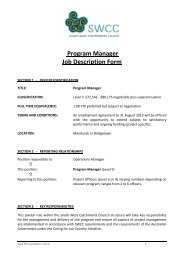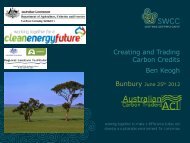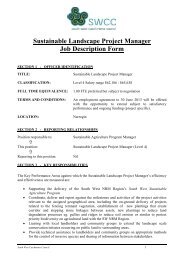Tender for the Programme - South West Catchments Council
Tender for the Programme - South West Catchments Council
Tender for the Programme - South West Catchments Council
Create successful ePaper yourself
Turn your PDF publications into a flip-book with our unique Google optimized e-Paper software.
DRAFT<br />
<strong>South</strong> <strong>West</strong> Regional NRM Strategy – Ancillary Document<br />
7. Fur<strong>the</strong>r discussion on emerging threats<br />
Horizon planning 4 is a workshop approach that has been developed fairly recently, allowing a group of<br />
people with shared interests to explore changes that might impact on <strong>the</strong>ir area of interest in <strong>the</strong> near to<br />
mid-term future, whe<strong>the</strong>r through human-induced or o<strong>the</strong>r causes. Generally specialists from a range of<br />
fields participate to ensure that as broad a range of factors as possible is discussed. Often, such sessions<br />
identify and highlight issues that are unlikely to have o<strong>the</strong>rwise been discovered.<br />
A group of scientists from around <strong>the</strong> world have been implementing <strong>the</strong> approach since 2009 to identify<br />
emerging issues <strong>for</strong> conservation, highlighting 15 key issues in an annual report. The latest of <strong>the</strong>se<br />
identified four trends that have some relevance to <strong>the</strong> <strong>South</strong> <strong>West</strong> NRM region (Su<strong>the</strong>rland et al. 2011):<br />
Human denial of long-term threats<br />
Global responses to climate change<br />
Trans<strong>for</strong>mation of oceans and domestication of marine species<br />
Hydraulic fracturing<br />
In addition, NRM stakeholders in <strong>the</strong> <strong>South</strong> <strong>West</strong> region have identified a number of o<strong>the</strong>r issues through<br />
direct consultation or at a workshop held in Bunbury on 2011. Each of <strong>the</strong>se issues is discussed in more<br />
detail below.<br />
7.1 Human denial of long-term threats<br />
A number of authors have argued that it is a predictable and natural human behaviour to deny long-term<br />
threats to human quality of life and health, such as climate change and biodiversity loss (Rees 2011). As<br />
an example, social responses to HIV-Aids consistently indicate that a large proportion of society will deny<br />
scientific evidence and that individuals will only change <strong>the</strong>ir behaviour when <strong>the</strong>y personally experience<br />
serious, immediate impacts. It should <strong>the</strong>re<strong>for</strong>e be expected that society will respond to climate change in<br />
a similar manner, and indeed, <strong>the</strong> proportion of people denying climate change in <strong>the</strong> USA is now<br />
increasing.<br />
Worse still, social psychologists suggest that denial is expected to increase both in extent and intensity as<br />
scientific evidence of a threat from phenomena such as climate change or biodiversity loss accumulates 5 .<br />
This expected behaviour has major implications <strong>for</strong> much of <strong>the</strong> work conducted in <strong>the</strong> NRM field,<br />
particularly when combined with <strong>the</strong> ever-growing aspirations of people in developing countries <strong>for</strong> a<br />
“better life” that inexorably lead to increasing consumption levels.<br />
7.2 Decreasing rainfall<br />
The only global agreement with specific targets to control greenhouse gas emissions, <strong>the</strong> Kyoto Protocol,<br />
expires at <strong>the</strong> end of 2012. Failure of negotiating parties to reach agreement on a successor means that it<br />
is now almost inevitable that any new agreement will take effect some time after <strong>the</strong> Kyoto Protocol<br />
expires. It is even possible that a global agreement is not feasible. Never<strong>the</strong>less, local ef<strong>for</strong>ts to reduce<br />
emissions will probably continue in many countries. Under a global agreement, <strong>the</strong>re might be<br />
opportunities to optimize or target emission reduction mechanisms, particularly those designed to reduce<br />
de<strong>for</strong>estation or enhance carbon storage in natural systems, which might also benefit native species.<br />
Without an overarching global agreement, it is unclear which mechanisms will be available to ensure that<br />
4<br />
5<br />
Or as Su<strong>the</strong>rland et al (2010) put it, “Horizon scanning is <strong>the</strong> systematic search <strong>for</strong> incipient trends, opportunities and<br />
constraints that might affect <strong>the</strong> probability of achieving management goals and objectives. Explicit objectives of horizon<br />
scanning are to anticipate issues, accumulate data and knowledge about <strong>the</strong>m, and thus in<strong>for</strong>m crucial decisions.” It is a<br />
technique widely employed in <strong>the</strong> health sector, as well as business and in <strong>the</strong> defence <strong>for</strong>ces, but has not been widely used in<br />
<strong>the</strong> fields of conservation and natural resource management.<br />
Dickinson, J.L. 2009 The people paradox: self-esteem striving, immortality ideologies, and human response to climate<br />
change. Ecol. Soc. 14: 17<br />
206






